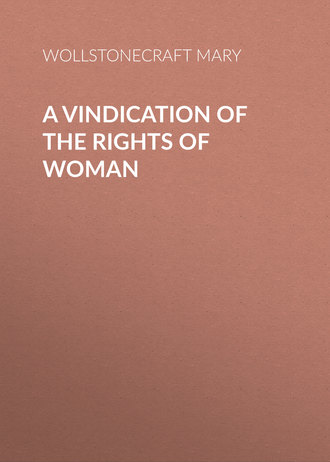 полная версия
полная версияA Vindication of the Rights of Woman
A man, when he undertakes a journey, has, in general the end in view; a woman thinks more of the incidental occurrences, the strange things that may possibly occur on the road; the impression that she may make on her fellow travellers; and, above all, she is anxiously intent on the care of the finery that she carries with her, which is more than ever a part of herself, when going to figure on a new scene; when, to use an apt French turn of expression, she is going to produce a sensation. Can dignity of mind exist with such trivial cares?
In short, women, in general, as well as the rich of both sexes, have acquired all the follies and vices of civilization, and missed the useful fruit. It is not necessary for me always to premise, that I speak of the condition of the whole sex, leaving exceptions out of the question. Their senses are inflamed, and their understandings neglected; consequently they become the prey of their senses, delicately termed sensibility, and are blown about by every momentary gust of feeling. They are, therefore, in a much worse condition than they would be in, were they in a state nearer to nature. Ever restless and anxious, their over exercised sensibility not only renders them uncomfortable themselves, but troublesome, to use a soft phrase, to others. All their thoughts turn on things calculated to excite emotion; and, feeling, when they should reason, their conduct is unstable, and their opinions are wavering, not the wavering produced by deliberation or progressive views, but by contradictory emotions. By fits and starts they are warm in many pursuits; yet this warmth, never concentrated into perseverance, soon exhausts itself; exhaled by its own heat, or meeting with some other fleeting passion, to which reason has never given any specific gravity, neutrality ensues. Miserable, indeed, must be that being whose cultivation of mind has only tended to inflame its passions! A distinction should be made between inflaming and strengthening them. The passions thus pampered, whilst the judgment is left unformed, what can be expected to ensue? Undoubtedly, a mixture of madness and folly!
This observation should not be confined to the FAIR sex; however, at present, I only mean to apply it to them.
Novels, music, poetry and gallantry, all tend to make women the creatures of sensation, and their character is thus formed during the time they are acquiring accomplishments, the only improvement they are excited, by their station in society, to acquire. This overstretched sensibility naturally relaxes the other powers of the mind, and prevents intellect from attaining that sovereignty which it ought to attain, to render a rational creature useful to others, and content with its own station; for the exercise of the understanding, as life advances, is the only method pointed out by nature to calm the passions.
Satiety has a very different effect, and I have often been forcibly struck by an emphatical description of damnation, when the spirit is represented as continually hovering with abortive eagerness round the defiled body, unable to enjoy any thing without the organs of sense. Yet, to their senses, are women made slaves, because it is by their sensibility that they obtain present power.
And will moralists pretend to assert, that this is the condition in which one half of the human race should be encouraged to remain with listless inactivity and stupid acquiescence? Kind instructors! what were we created for? To remain, it may be said, innocent; they mean in a state of childhood. We might as well never have been born, unless it were necessary that we should be created to enable man to acquire the noble privilege of reason, the power of discerning good from evil, whilst we lie down in the dust from whence we were taken, never to rise again.
It would be an endless task to trace the variety of meannesses, cares, and sorrows, into which women are plunged by the prevailing opinion, that they were created rather to feel than reason, and that all the power they obtain, must be obtained by their charms and weakness;
"Fine by defect, and amiably weak!"
And, made by this amiable weakness entirely dependent, excepting what they gain by illicit sway, on man, not only for protection, but advice, is it surprising that, neglecting the duties that reason alone points out, and shrinking from trials calculated to strengthen their minds, they only exert themselves to give their defects a graceful covering, which may serve to heighten their charms in the eye of the voluptuary, though it sink them below the scale of moral excellence?
Fragile in every sense of the word, they are obliged to look up to man for every comfort. In the most trifling dangers they cling to their support, with parasitical tenacity, piteously demanding succour; and their NATURAL protector extends his arm, or lifts up his voice, to guard the lovely trembler—from what? Perhaps the frown of an old cow, or the jump of a mouse; a rat, would be a serious danger. In the name of reason, and even common sense, what can save such beings from contempt; even though they be soft and fair?
These fears, when not affected, may be very pretty; but they shew a degree of imbecility, that degrades a rational creature in a way women are not aware of—for love and esteem are very distinct things.
I am fully persuaded, that we should hear of none of these infantine airs, if girls were allowed to take sufficient exercise and not confined in close rooms till their muscles are relaxed and their powers of digestion destroyed. To carry the remark still further, if fear in girls, instead of being cherished, perhaps, created, were treated in the same manner as cowardice in boys, we should quickly see women with more dignified aspects. It is true, they could not then with equal propriety be termed the sweet flowers that smile in the walk of man; but they would be more respectable members of society, and discharge the important duties of life by the light of their own reason. "Educate women like men," says Rousseau, "and the more they resemble our sex the less power will they have over us." This is the very point I aim at. I do not wish them to have power over men; but over themselves.
In the same strain have I heard men argue against instructing the poor; for many are the forms that aristocracy assumes. "Teach them to read and write," say they, "and you take them out of the station assigned them by nature." An eloquent Frenchman, has answered them; I will borrow his sentiments. But they know not, when they make man a brute, that they may expect every instant to see him transformed into a ferocious beast. Without knowledge there can be no morality!
Ignorance is a frail base for virtue! Yet, that it is the condition for which woman was organized, has been insisted upon by the writers who have most vehemently argued in favour of the superiority of man; a superiority not in degree, but essence; though, to soften the argument, they have laboured to prove, with chivalrous generosity, that the sexes ought not to be compared; man was made to reason, woman to feel: and that together, flesh and spirit, they make the most perfect whole, by blending happily reason and sensibility into one character.
And what is sensibility? "Quickness of sensation; quickness of perception; delicacy." Thus is it defined by Dr. Johnson; and the definition gives me no other idea than of the most exquisitely polished instinct. I discern not a trace of the image of God in either sensation or matter. Refined seventy times seven, they are still material; intellect dwells not there; nor will fire ever make lead gold!
I come round to my old argument; if woman be allowed to have an immortal soul, she must have as the employment of life, an understanding to improve. And when, to render the present state more complete, though every thing proves it to be but a fraction of a mighty sum, she is incited by present gratification to forget her grand destination. Nature is counteracted, or she was born only to procreate and rot. Or, granting brutes, of every description, a soul, though not a reasonable one, the exercise of instinct and sensibility may be the step, which they are to take, in this life, towards the attainment of reason in the next; so that through all eternity they will lag behind man, who, why we cannot tell, had the power given him of attaining reason in his first mode of existence.
When I treat of the peculiar duties of women, as I should treat of the peculiar duties of a citizen or father, it will be found that I do not mean to insinuate, that they should be taken out of their families, speaking of the majority. "He that hath wife and children," says Lord Bacon, "hath given hostages to fortune; for they are impediments to great enterprises, either of virtue or mischief. Certainly the best works, and of greatest merit for the public, have proceeded from the unmarried or childless men." I say the same of women. But, the welfare of society is not built on extraordinary exertions; and were it more reasonably organized, there would be still less need of great abilities, or heroic virtues. In the regulation of a family, in the education of children, understanding, in an unsophisticated sense, is particularly required: strength both of body and mind; yet the men who, by their writings, have most earnestly laboured to domesticate women, have endeavoured by arguments dictated by a gross appetite, that satiety had rendered fastidious, to weaken their bodies and cramp their minds. But, if even by these sinister methods they really PERSUADED women, by working on their feelings, to stay at home, and fulfil the duties of a mother and mistress of a family, I should cautiously oppose opinions that led women to right conduct, by prevailing on them to make the discharge of a duty the business of life, though reason were insulted. Yet, and I appeal to experience, if by neglecting the understanding they are as much, nay, more attached from these domestic duties, than they could be by the most serious intellectual pursuit, though it may be observed, that the mass of mankind will never vigorously pursue an intellectual object, I may be allowed to infer, that reason is absolutely necessary to enable a woman to perform any duty properly, and I must again repeat, that sensibility is not reason.
The comparison with the rich still occurs to me; for, when men neglect the duties of humanity, women will do the same; a common stream hurries them both along with thoughtless celerity. Riches and honours prevent a man from enlarging his understanding, and enervate all his powers, by reversing the order of nature, which has ever made true pleasure the reward of labour. Pleasure—enervating pleasure is, likewise, within woman's reach without earning it. But, till hereditary possessions are spread abroad, how can we expect men to be proud of virtue? And, till they are, women will govern them by the most direct means, neglecting their dull domestic duties, to catch the pleasure that is on the wing of time.
"The power of women," says some author, "is her sensibility;" and men not aware of the consequence, do all they can to make this power swallow up every other. Those who constantly employ their sensibility will have most: for example; poets, painters, and composers. Yet, when the sensibility is thus increased at the expense of reason, and even the imagination, why do philosophical men complain of their fickleness? The sexual attention of man particularly acts on female sensibility, and this sympathy has been exercised from their youth up. A husband cannot long pay those attentions with the passion necessary to excite lively emotions, and the heart, accustomed to lively emotions, turns to a new lover, or pines in secret, the prey of virtue or prudence. I mean when the heart has really been rendered susceptible, and the taste formed; for I am apt to conclude, from what I have seen in fashionable life, that vanity is oftener fostered than sensibility by the mode of education, and the intercourse between the sexes, which I have reprobated; and that coquetry more frequently proceeds from vanity than from that inconstancy, which overstrained sensibility naturally produces.
Another argument that has had a great weight with me, must, I think, have some force with every considerate benevolent heart. Girls, who have been thus weakly educated, are often cruelly left by their parents without any provision; and, of course, are dependent on, not only the reason, but the bounty of their brothers. These brothers are, to view the fairest side of the question, good sort of men, and give as a favour, what children of the same parents had an equal right to. In this equivocal humiliating situation, a docile female may remain some time, with a tolerable degree of comfort. But, when the brother marries, a probable circumstance, from being considered as the mistress of the family, she is viewed with averted looks as an intruder, an unnecessary burden on the benevolence of the master of the house, and his new partner.
Who can recount the misery, which many unfortunate beings, whose minds and bodies are equally weak, suffer in such situations—unable to work and ashamed to beg? The wife, a cold-hearted, narrow-minded woman, and this is not an unfair supposition; for the present mode of education does not tend to enlarge the heart any more than the understanding, is jealous of the little kindness which her husband shows to his relations; and her sensibility not rising to humanity, she is displeased at seeing the property of HER children lavished on an helpless sister.
These are matters of fact, which have come under my eye again and again. The consequence is obvious, the wife has recourse to cunning to undermine the habitual affection, which she is afraid openly to oppose; and neither tears nor caresses are spared till the spy is worked out of her home, and thrown on the world, unprepared for its difficulties; or sent, as a great effort of generosity, or from some regard to propriety, with a small stipend, and an uncultivated mind into joyless solitude.
These two women may be much upon a par, with respect to reason and humanity; and changing situations, might have acted just the same selfish part; but had they been differently educated, the case would also have been very different. The wife would not have had that sensibility, of which self is the centre, and reason might have taught her not to expect, and not even to be flattered by the affection of her husband, if it led him to violate prior duties. She would wish not to love him, merely because he loved her, but on account of his virtues; and the sister might have been able to struggle for herself, instead of eating the bitter bread of dependence.
I am, indeed, persuaded that the heart, as well as the understanding, is opened by cultivation; and by, which may not appear so clear, strengthening the organs; I am not now talking of momentary flashes of sensibility, but of affections. And, perhaps, in the education of both sexes, the most difficult task is so to adjust instruction as not to narrow the understanding, whilst the heart is warmed by the generous juices of spring, just raised by the electric fermentation of the season; nor to dry up the feelings by employing the mind in investigations remote from life.
With respect to women, when they receive a careful education, they are either made fine ladies, brimful of sensibility, and teeming with capricious fancies; or mere notable women. The latter are often friendly, honest creatures, and have a shrewd kind of good sense joined with worldly prudence, that often render them more useful members of society than the fine sentimental lady, though they possess neither greatness of mind nor taste. The intellectual world is shut against them; take them out of their family or neighbourhood, and they stand still; the mind finding no employment, for literature affords a fund of amusement, which they have never sought to relish, but frequently to despise. The sentiments and taste of more cultivated minds appear ridiculous, even in those whom chance and family connexions have led them to love; but in mere acquaintance they think it all affectation.
A man of sense can only love such a woman on account of her sex, and respect her, because she is a trusty servant. He lets her, to preserve his own peace, scold the servants, and go to church in clothes made of the very best materials. A man of her own size of understanding would, probably, not agree so well with her; for he might wish to encroach on her prerogative, and manage some domestic concerns himself. Yet women, whose minds are not enlarged by cultivation, or the natural selfishness of sensibility expanded by reflection, are very unfit to manage a family; for by an undue stretch of power, they are always tyrannizing to support a superiority that only rests on the arbitrary distinction of fortune. The evil is sometimes more serious, and domestics are deprived of innocent indulgences, and made to work beyond their strength, in order to enable the notable woman to keep a better table, and outshine her neighbours in finery and parade. If she attend to her children, it is, in general, to dress them in a costly manner—and, whether, this attention arises from vanity or fondness, it is equally pernicious.
Besides, how many women of this description pass their days, or, at least their evenings, discontentedly. Their husbands acknowledge that they are good managers, and chaste wives; but leave home to seek for more agreeable, may I be allowed to use a significant French word, piquant society; and the patient drudge, who fulfils her task, like a blind horse in a mill, is defrauded of her just reward; for the wages due to her are the caresses of her husband; and women who have so few resources in themselves, do not very patiently bear this privation of a natural right.
A fine lady, on the contrary, has been taught to look down with contempt on the vulgar employments of life; though she has only been incited to acquire accomplishments that rise a degree above sense; for even corporeal accomplishments cannot be acquired with any degree of precision, unless the understanding has been strengthened by exercise. Without a foundation of principles taste is superficial; and grace must arise from something deeper than imitation. The imagination, however, is heated, and the feelings rendered fastidious, if not sophisticated; or, a counterpoise of judgment is not acquired, when the heart still remains artless, though it becomes too tender.
These women are often amiable; and their hearts are really more sensible to general benevolence, more alive to the sentiments that civilize life, than the square elbowed family drudge; but, wanting a due proportion of reflection and self-government, they only inspire love; and are the mistresses of their husbands, whilst they have any hold on their affections; and the platonic friends of his male acquaintance. These are the fair defects in nature; the women who appear to be created not to enjoy the fellowship of man, but to save him from sinking into absolute brutality, by rubbing off the rough angles of his character; and by playful dalliance to give some dignity to the appetite that draws him to them. Gracious Creator of the whole human race! hast thou created such a being as woman, who can trace thy wisdom in thy works, and feel that thou alone art by thy nature, exalted above her—for no better purpose? Can she believe that she was only made to submit to man her equal; a being, who, like her, was sent into the world to acquire virtue? Can she consent to be occupied merely to please him; merely to adorn the earth, when her soul is capable of rising to thee? And can she rest supinely dependent on man for reason, when she ought to mount with him the arduous steeps of knowledge?
Yet, if love be the supreme good, let women be only educated to inspire it, and let every charm be polished to intoxicate the senses; but, if they are moral beings, let them have a chance to become intelligent; and let love to man be only a part of that glowing flame of universal love, which, after encircling humanity, mounts in grateful incense to God.
To fulfil domestic duties much resolution is necessary, and a serious kind of perseverance that requires a more firm support than emotions, however lively and true to nature. To give an example of order, the soul of virtue, some austerity of behaviour must be adopted, scarcely to be expected from a being who, from its infancy, has been made the weathercock of its own sensations. Whoever rationally means to be useful, must have a plan of conduct; and, in the discharge of the simplest duty, we are often obliged to act contrary to the present impulse of tenderness or compassion. Severity is frequently the most certain, as well as the most sublime proof of affection; and the want of this power over the feelings, and of that lofty, dignified affection, which makes a person prefer the future good of the beloved object to a present gratification, is the reason why so many fond mothers spoil their children, and has made it questionable, whether negligence or indulgence is most hurtful: but I am inclined to think, that the latter has done most harm.
Mankind seem to agree, that children should be left under the management of women during their childhood. Now, from all the observation that I have been able to make, women of sensibility are the most unfit for this task, because they will infallibly, carried away by their feelings, spoil a child's temper. The management of the temper, the first and most important branch of education, requires the sober steady eye of reason; a plan of conduct equally distant from tyranny and indulgence; yet these are the extremes that people of sensibility alternately fall into; always shooting beyond the mark. I have followed this train of reasoning much further, till I have concluded, that a person of genius is the most improper person to be employed in education, public or private. Minds of this rare species see things too much in masses, and seldom, if ever, have a good temper. That habitual cheerfulness, termed good humour, is, perhaps, as seldom united with great mental powers, as with strong feelings. And those people who follow, with interest and admiration, the flights of genius; or, with cooler approbation suck in the instruction, which has been elaborately prepared for them by the profound thinker, ought not to be disgusted, if they find the former choleric, and the latter morose; because liveliness of fancy, and a tenacious comprehension of mind, are scarcely compatible with that pliant urbanity which leads a man, at least to bend to the opinions and prejudices of others, instead of roughly confronting them.
But, treating of education or manners, minds of a superior class are not to be considered, they may be left to chance; it is the multitude, with moderate abilities, who call for instruction, and catch the colour of the atmosphere they breathe. This respectable concourse, I contend, men and women, should not have their sensations heightened in the hot-bed of luxurious indolence, at the expence of their understanding; for, unless there be a ballast of understanding, they will never become either virtuous or free: an aristocracy, founded on property, or sterling talents, will ever sweep before it, the alternately timid and ferocious slaves of feeling.
Numberless are the arguments, to take another view of the subject, brought forward with a show of reason; because supposed to be deduced from nature, that men have used morally and physically to degrade the sex. I must notice a few.
The female understanding has often been spoken of with contempt, as arriving sooner at maturity than the male. I shall not answer this argument by alluding to the early proofs of reason, as well as genius, in Cowley, Milton, and Pope, (Many other names might be added.) but only appeal to experience to decide whether young men, who are early introduced into company (and examples now abound) do not acquire the same precocity. So notorious is this fact, that the bare mentioning of it must bring before people, who at all mix in the world, the idea of a number of swaggering apes of men whose understandings are narrowed by being brought into the society of men when they ought to have been spinning a top or twirling a hoop.
It has also been asserted, by some naturalists, that men do not attain their full growth and strength till thirty; but that women arrive at maturity by twenty. I apprehend that they reason on false ground, led astray by the male prejudice, which deems beauty the perfection of woman—mere beauty of features and complexion, the vulgar acceptation of the world, whilst male beauty is allowed to have some connexion with the mind. Strength of body, and that character of countenance, which the French term a physionomie, women do not acquire before thirty, any more than men. The little artless tricks of children, it is true, are particularly pleasing and attractive; yet, when the pretty freshness of youth is worn off, these artless graces become studied airs, and disgust every person of taste. In the countenance of girls we only look for vivacity and bashful modesty; but, the springtide of life over, we look for soberer sense in the face, and for traces of passion, instead of the dimples of animal spirits; expecting to see individuality of character, the only fastener of the affections. We then wish to converse, not to fondle; to give scope to our imaginations, as well as to the sensations of our hearts.






